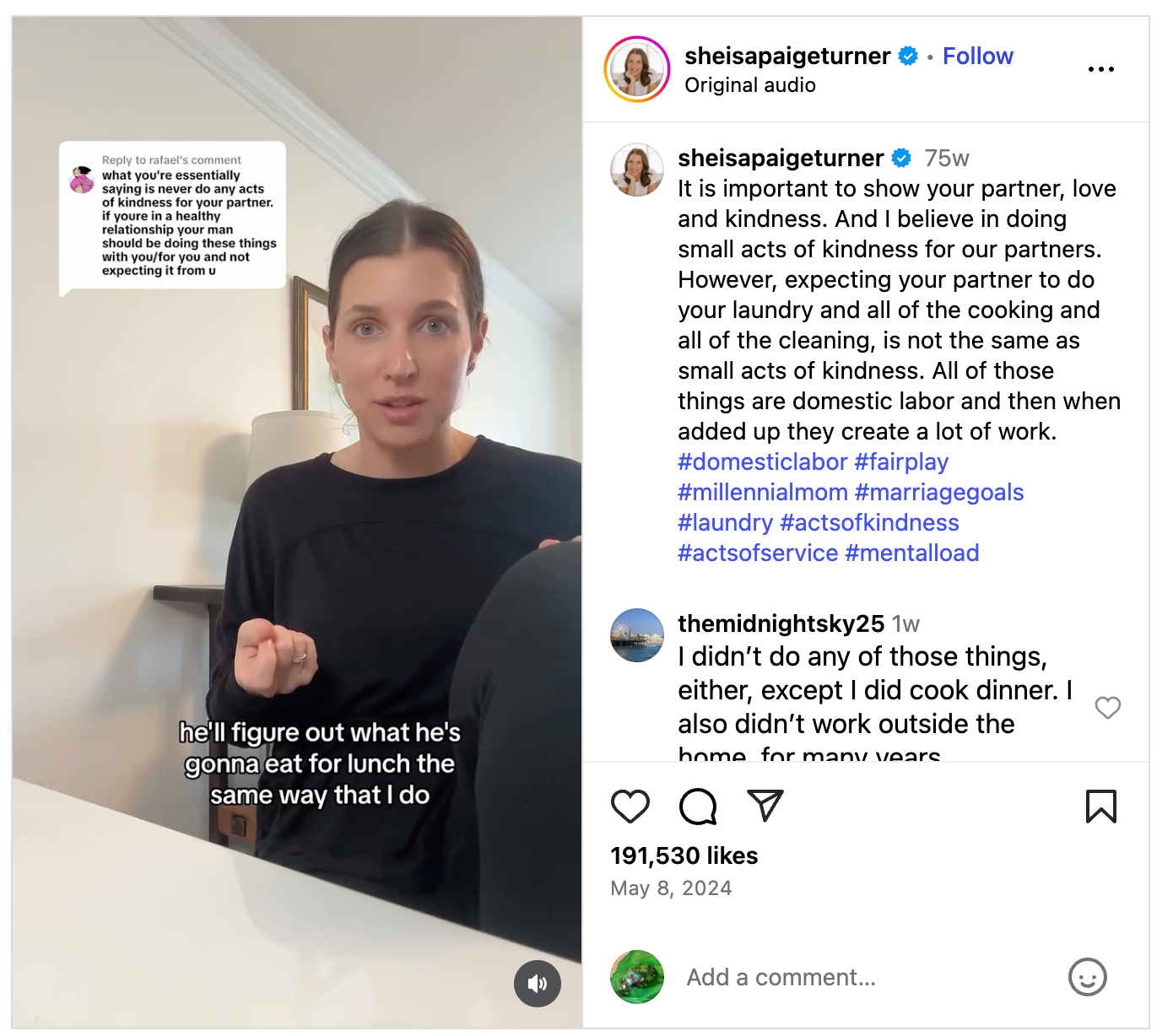In Defense of Professional Momplainers

A while back, a friend was talking to me about a content creator, Renee Reina, whose focus is on motherhood, domestic inequity, and such. This woman has made some excellent videos making obvious that one parent working a 9-5 does not mean the stay at home parent should work 24/7, and that coming home and starting to participate in your family life doesn't mean you are "doing your partner's job." One of her most famous videos is one where she demonstrates with LEGO how the parent who works outside the home ought to see if the stay at home parent would like to switch off so they can do something different.
However, Renee seems to get a lot of comments from people about how her life is so easy, she's just looking for problems, she should get in touch with the real world where people deal with actual problems, etc. I've thought about this issue of how to critique the work of content creators who focus heavily on topics like domestic inequity, the default parent, overstimulation, and the need for real breaks, etc. because I see a lot of personal criticism of the women who make these videos. These "momplainers" are regularly described as whiny, spoiled, and are met with stories of how much worse some women have it, as though that does anything other than prove their thesis that modern motherhood has a problem.

These women face much more criticism for their work than do men who run podcasts talking about how women's value comes from being young and pleasing to men, for example, or people of either gender talking about politics, economics, health, education, etc. There is a special nerve that is triggered when women talk candidly about motherhood and how hard it can be.
Why is that? Why can men talk about kids being a handful without being called bad dads and told they shouldn't have had kids, and so on, but if a mom does, she should prepare to have her innate value questioned because she is clearly a monster who hates her children and husband, is only struggling because she's incompetent and selfish, and should have done everyone a favor by not having children if she was going to ruin the planet by venting now and then? Critics opine how her husband must be miserable, wonder what she ever does for him, and criticize her not appreciating how lucky she is to stay home (whether or not she is a stay-at-home-parent, it's assumed and then criticized). It's a trifecta of shaming, blaming, and gaslighting.

Ultimately, I'd argue that there are two things driving the ragey response to momplainers. One, our survival as a species depends upon lots of women deciding that having multiple kids is worth it. Right now, in the developed world, women are increasingly deciding it is not worth it, leading to a collapsing birth rate and lots of problems downstream from that. Rather than examining why so many women are foregoing one of the most meaningful parts of human life, many people resort to mocking them as materialistic girl bosses and impugning their sexual morality. So far, puzzlingly, this tactic has not created an increased desire to partner with men and have their children.
Two, and this will be fleshed out in another essay, looking closely at domestic equity challenges many of our deeply held beliefs about men and women, fathers and mothers. This discomfort causes people to form ad hominem arguments against the speaker, looking for a way to discredit the person shining a light on our society's uneasy peace with "good dads."
Admittedly, it can be hard to hear the complaints of content creators talking about the mental load or being the default parent, when so many of the most prominent ones seem privileged, and thus come across as extra whiny. Sometimes they make videos looking incredibly put-out by their one or two children's very normal behavior, with their stunning homes in the background. It is often the case that they have a high-earning husband off-screen; some of them are making a fortune doing content creation, while posing as stay-at-home-parents. For people who hardly have time to follow content creators, let alone set up tripods, take videos, edit and post them, and then manage comments, let alone sponsors, it can feel like these women are searching for things to whine about if they have this much time to complain about how overburdened they are.
However, this reminds me of an aspect of the tragedy of metastatic breast cancer (MBC). While we know that one in eight women will develop breast cancer, most people don't know that one in three of these women will have it metastasize, and it will go from something with a very high survival rate, to something that comes with an improved life expectancy of 30-39 months, if they undergo grueling treatments to stay alive that long. We need people advocating for MBC research, which only receives about 13% of all breast cancer funding, even though it is the type that causes most of the deaths. Can people who are frail and fighting for a few extra months be asked to do this advocacy work? Very few. While I admire those whose advocacy and personal testimonies have helped shine a light on this important cause, I think the rest of us need to pick up the baton and run the race. People who are in the fight of their lives need and deserve help from the healthy people around them. And what is the connection to our "privileged momplainers," you ask?
They are doing the work of drawing awareness to the astounding double standards mothers struggle against, the invisible but pernicious mental load, the difficulty of having a good marriage when one's spouse is more work than the children (but criticizing him will result in her being the bad guy, both in private with him, and in public with anyone hearing it). Momplainers have fundamentally improved the conversation around domestic inequity by creating a vocabulary that captures the maddeningly circuitous logic that has long kept women running in place, blaming themselves instead of impossible societal standards coupled with no village or safety net and an inadequate partner who gets praised for anything he does or does not do.
In the comment sections of many of these videos, there are older women who describe how they tried to get their husbands, often ex-husbands, to understand how exhausting it was trying to do everything for everyone all the time, while never being considered by others. Prior to social media, women might grouse about these things in small groups, but it was never really possible to see enough data to realize that an enormous percentage of women were living in marriages where they were being exploited for their cooking, cleaning, childbearing and rearing, for sex, and not infrequently, money, while receiving little, if any, support in return.
No matter how little a woman asked of her husband, there was always someone there to tell her, "Men just aren't like that, they don't think of things like gifts or your feelings." There was always someone to helpfully point out that at least her husband wasn't beating, raping, or killing her, or at least he worked, demonstrating how the bottom decile of men really are the shock troops of male supremacy. It is impossible to work on domestic inequity when the culture is still praising men for not abusing or killing their wives. If you're a good husband because you don't rape or hit your wife, and you work, then you can't also be a bad husband when you only do 15% of the housework and don't know your kids' middle names. But many men are both of these things at the same time: non-violent and exploitive towards their wives. They are not good men, they are just not as bad as the worst men, and they get a lot of credit for that.
But today? Women have the words to label what is happening to them. Instead of having to tell a long story about how their spouse makes a habit of doing an unbelievably bad job when tasked with domestic labor, women can refer to "weaponized incompetence." He is doing it badly so that he doesn't have to do it again.
Women don't have to justify with a long diatribe about how much time it takes to manage a household and family, with the specific appointments, maintenance, follow-ups, etc. She can say, "mental load" and the woman she is speaking to knows what she means.
Being readily understood by another adult then makes the gaslighting from her partner ineffectual, which is one reason why extreme patriarchies try to curtail female speech and friendship. I personally have seen thousands of comments online from men arguing that social media is bad for women and is what is driving the "feminazis," as they describe all women who have standards.
Today's woman does not need to justify that her (petty) "personal preference" is for dishes to be actually clean or children to eat at meal times even if she is not the parent at home. She can refer to the "minimum standard of care." She can also recognize that it's reasonable to expect a partner to agree upon standards, rather than pretending that she is so picky that she should just do all the work herself.
She does not sound crazy when she talks about how doing "emotional labor" is exhausting when there is no respite. Most people now understand that helping others manage their emotions is hard, especially when those others are emotionally immature, whether they are children or partners. It is more akin to taking customer service calls than it is to reading a book on the beach, even though it is often sanctifying and important.
The term "default parent" helps her describe the way she becomes a catchall for the children's every need, even when the other partner is around, even if he has had plenty of rest and free time and she has just been hit by a truck. She is the one who will presumably take care of the kids if her partner simply decides to go for a run or shower, but if she wants a shower, she has to communicate to her partner that he is now on duty. Whether or not he actually parents appropriately varies with the father.
So, while there may be valid criticisms to lob at momplainers, my hat is off to them. I am grateful to the people who have done the work to read the books and research on these topics, to think deeply about why every generation seems to have these same problems that result in disengaged men and exhausted women.

What now remains is for us to build a culture where men and women can experience their full humanity and appreciate each other's full humanity. We must push back on any verbiage that treats motherhood as a list of chores rather than a relationship, or winks at men exploiting their female partners. In a culture that is currently grappling absurdly with concepts like "being in one's feminine energy" or being an "alpha male," it is more important than ever that we are able to offer clarity on what a woman is, what a man is, and how they should treat each other.
Every time we laugh at incompetent fathering, we reinforce the idea that the work of raising children is unimportant and beneath male notice, and we reinforce male supremacy. Every time we carelessly criticize mothers for their small shortcomings, we further solidify the idea that women can and ought to do all the work of parenting perfectly on their own, rather than recognizing women as human beings who are also learning on the job. While it may seem anti-male to have referenced incompetent and lazy fathers so much in this essay, it is because it is my firm belief that men are fully human that I object to low paternal standards.
A culture that laughs at imbecile fathers is also a culture that makes no allowances for new dads to take leave and start parenthood on the right foot, that tasks women with most of the labor that makes home life possible and then frames it as her "not working" or "choosing a lower paying job," that sets aside the needs of infants and children as secondary to productivity in the workplace or convenience. Many people want to end the gender war by ending the discussion, but the discussion is necessary to get to a place where there is not a war being waged on the human person, and on the family in the first place. If you want peace, seek justice.
We must get to a place where our default assumptions and actions support families living fully human lives, together, in peace. Understanding what the problems are first is one key. Being willing to change the way we talk to and about parents is another.

